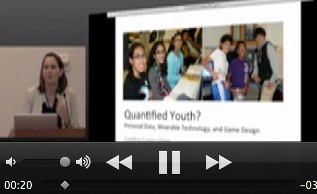Quantified Youth? An Overview of Research into Gaming and Health
Cynthia Carter Ching, associate professor of learning and mind sciences
In January 2015, Cynthia Carter Ching, presented lessons learned about her research into the use of gaming to impact youth health at a two-day Cyberlearning Summit sponsored by the National Science Foundation (NSF). Ching was the recipient of a just-concluded two-year grant from the National Science Foundation to design a game that puts youth personal health and well-being at the center of a virtual universe where the choices the user makes are based on personal data about key health and nutrition indicators.
At the Cyberlearning Summit, Ching joined several other recipients of cyberlearning grants to provide quick overviews of their research and to provide workshops for other researchers about how to grow and strategically shape this field of inquiry. One of the first researchers to receive the exploratory cyberlearning grant, Ching is now embarking on an NSF EAGER (Early Concept Grants for Exploratory Research) project to develop a behavioral change model for physical activity-monitor gaming that is thus far unique in the existing literatures on games and learning, games for health, and health education/intervention.
“We know that personal data is key to making more informed and better life choices,” said Ching in a recent discussion of this research. “But many of the devices we use to measure and analyze our personal fitness data require infrastructure, such as cell phones and laptops. The target for this market has been upper middle-class adults who have access to these tools and the data literacy to use them. The target is not poor kids, who also often lack access to parks or other opportunities to exercise outside of school.”
During their research, Ching and her colleagues have found that even youth from more affluent suburban areas, who may have access to the necessary tools to analyze their data are not interested in using them. “One of the keys to this next phase of our research is to figure out how we can capitalize on the potential of ‘quantified-self technology’ to promote physical fitness and connect youth experiences across environments, and do it in such a way that addresses challenges to access, data literacy and preferred media use,” she said.









